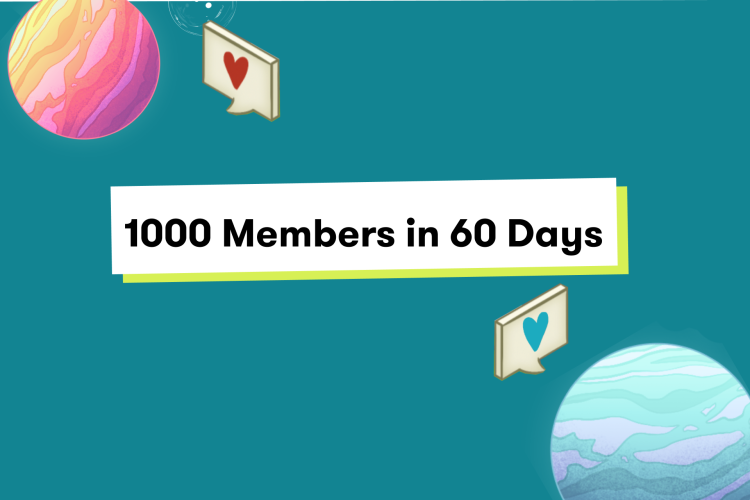Communities & Memberships
Twitter vs. Mastodon: Which Is Right You? (+ a Better Alternative)
If you’re following the buzz over Twitter and the exodus of users to Mastodon, we’ll show you what these give you and what they don’t.
Author
Last Updated
February 6, 2025

Table of Contents
Twitter was created in 2006, and in the decades that followed the little bird tweeted its way into the hearts and minds of 400 million users. Twitter was made up of famously short, text-based content composed in “tweets.” Long-time users of the platform will remember the kerfuffle when tweets expanded from their original 140-character limit to 280 and the brief outrage that followed.
With Elon Musk’s +$40 billion Twitter acquisition in October 2022, a lot of people have been fleeing the platform. Some object to Musk himself, whether it’s his political views or his leadership style. And some people just aren’t buying into his vision for the platform.
One of the Twitter alternatives that’s been making waves lately is Mastodon. Created in 2016 as an open-source, decentralized social forum, Mastodon touts (or we should say “toots”) itself as the better option for long-time Twitter users. With celebrities like Kathy Griffin and Stephen Fry making the switch, you might be wondering if it’s time for you to try it too.
In this article, we’ll talk about Twitter vs. Mastodon, showing how the wooly mammoth compares to the little blue bird, and we’ll introduce a better option.
If you want more support in building your online community, come join OUR Mighty Community for free and meet other new and established community owners! We’d love to meet you. Join for free!
What is Mastodon
Mastodon is a decentralized social network that’s hosted on what users refer to the “fediverse” – that basically means that the network lives on independent servers that can talk to each other. This gives it a bit of a local-to-social network feel. Created in 2016 by Eugen Rochko, Mastodon feels a bit like independent social networks that all speak the same language.
But, if the individual server part of Mastodon freaks you out, let’s say this. Once you get past the individual hosting (ie. where your information lives), the user experience is ridiculously similar to Twitter, maybe with a bit of Discord thrown in. Instead of a “tweet” you “toot.” Instead of “liking,” you “favorite” something. Long-time users of Twitter will probably recognize Mastodon as a sort of generic brand Twitter – although with 500 characters.
Mastodon lets you create an account, where you can add a profile pic, a link to your website, or other features that people put in their Twitter Bio. Like Twitter, you get a head count of your followers and the people you’re following. You can reply, boost (AKA “retweet”), star (favorite) something, or bookmark toots.
Pros and cons of Mastodon
Pros
Mastodon feels like Twitter. The usability should be pretty familiar, allowing you to get an account up and running quickly. Posting, uploading photos and videos, and even polls feel almost identical.
It’s got similar interactive functions too. You can send direct messages to people, follow them, block them, or mention them with an @.
The decentralized feel gives you MORE options than Twitter for building something like a space, a dedicated server where users interested in a specific topic can come together.
There are no ads on Mastodon. People have been creating servers either by paying out of pocket or with crowdfunding. This has some issues, which we’ll talk about below, but it’s nice in theory.
The operating code for Mastodon is open source. This is generally a positive thing since people can adopt it and use it to customize their own discussions. In addition to the Mastodon official apps, people have used Mastodon’s open-source code to create their own social apps.
You aren’t limited to people on your own server. You can follow people across the platform, whatever server they happen to live on. You can also mark servers as either open to join, or make potential users request to join.
Cons
There’s no algorithm. Users see posts in the order they’re posted. This sounds great at first but in general decreases the usability of the platform.
Someone has to pay. It’s great not to have ads on Mastodon, but there could be a catch. Building your following on a server means someone has to pay for it, either you pay yourself or you'll be operating on a server someone else pays for. This is great if the funding lasts, but if someone decides it’s not worth their time to pay for the server it could disappear.
Mastodon is complicated to set up if you want to start your own channel. You need to figure out how to do your own hosting and install security protocols. If you’re not a programmer, you would probably need to hire one.
There are a lot of security concerns with the way this platform is structured. Requiring people to "apply" to a server can help a bit, and so can the “block” features. But there’s no real moderation and you can see almost anyone anywhere, no matter what server they’re on. And since it’s grassroots, there’s nobody to try to fix the culture when it inevitably gets taken over by bots and trolls.
There’s no real way to monetize on Mastodon. Not only that, but it’s not free. Whoever is hosting the network has to pay for it and there aren’t ads. As of now, this is being done by donors, raising serious concerns about the longevity of these networks.
It’s an open-source and decentralized community engine. Open source can be good, people can edit and fix bugs, but also bad – it’s been used to create controversial networks like Gab.
A better alternative to both Twitter AND Mastodon
As a Twitter alternative, Mastodon does a lot of the same things. But it’s harder to use, requires self-hosting if you want to create a server, and frankly, is missing a lot of the good features Twitter has. It’s easy to dismiss an algorithm, but on a traditional social network, the algorithm helps you see content that you want to see. When your feed is a never-ending and unorganized brain dump, it makes it tough to have conversations and grow community. We could think of Mastodon as a forum instead, but it doesn’t work as well as something like reddit, which has up-voting and down-voting to make sure people are seeing relevant material.
So let’s talk about an alternative.
Mighty Networks is a cultural software platform that works to build vibrant communities. But where Twitter is a massive social network and Mastodon is a huge collection of servers, Mighty lets you build a dedicated community full of members who share similar visions and goals.
Here are a few reasons to build a Mighty Network instead.
True usability
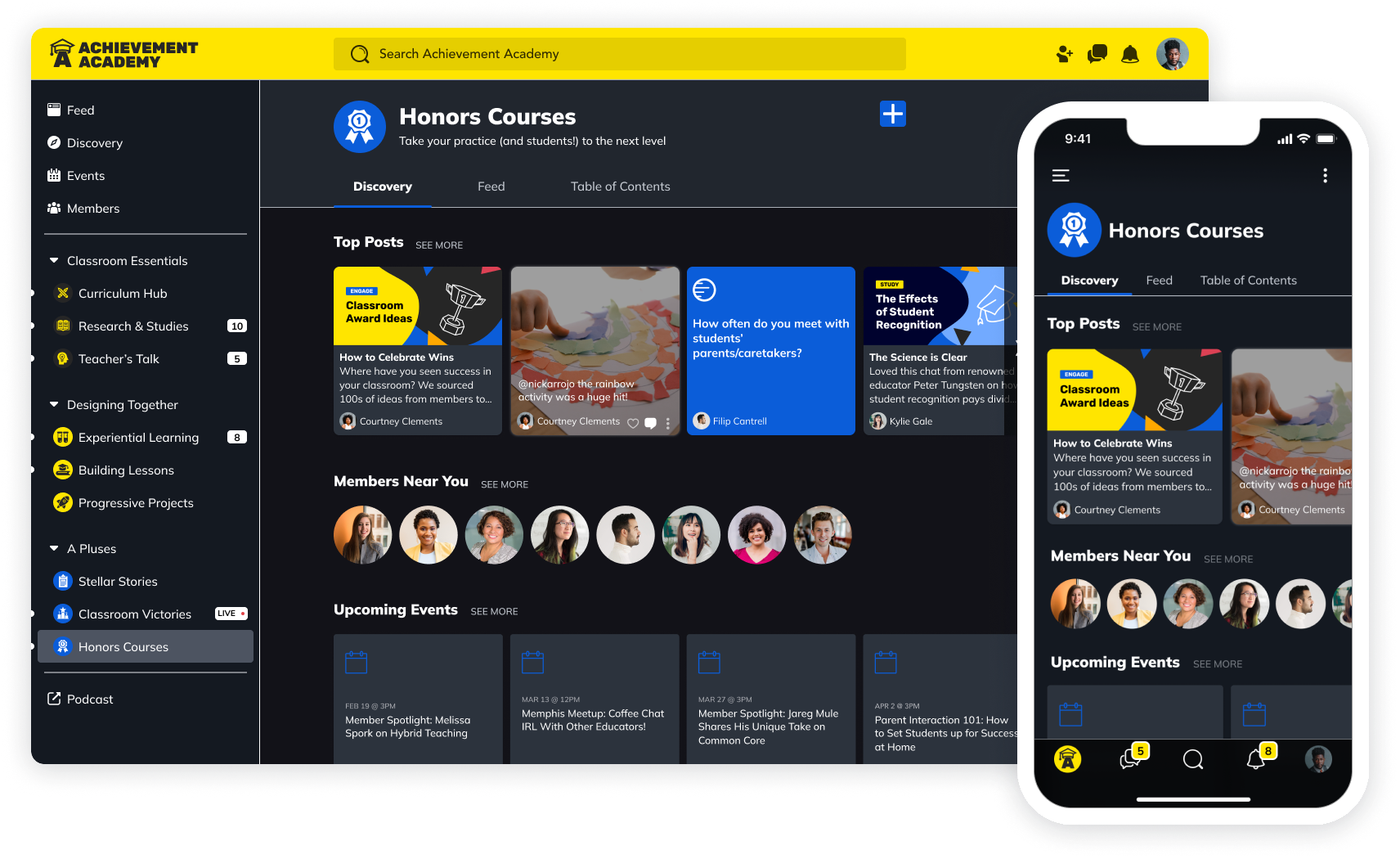
Where Mastodon requires coding and hosting to be able to set up your own server, Mighty Networks gives you a powerful community right out of the box. Anyone can easily create, grow, and even monetize a beautiful community that blows both Twitter and Mastodon out of the water.
Real content features
280 characters? 500? Who cares? A Mighty Network gives you ACTUAL content features. Create posts if you want, or create full-length articles (blog posts). You can create polls and discussions, organize discussions, live stream, add events, and build courses. Mighty is a platform designed to make community work and to bring a group of strangers together and help them become life-long friends.
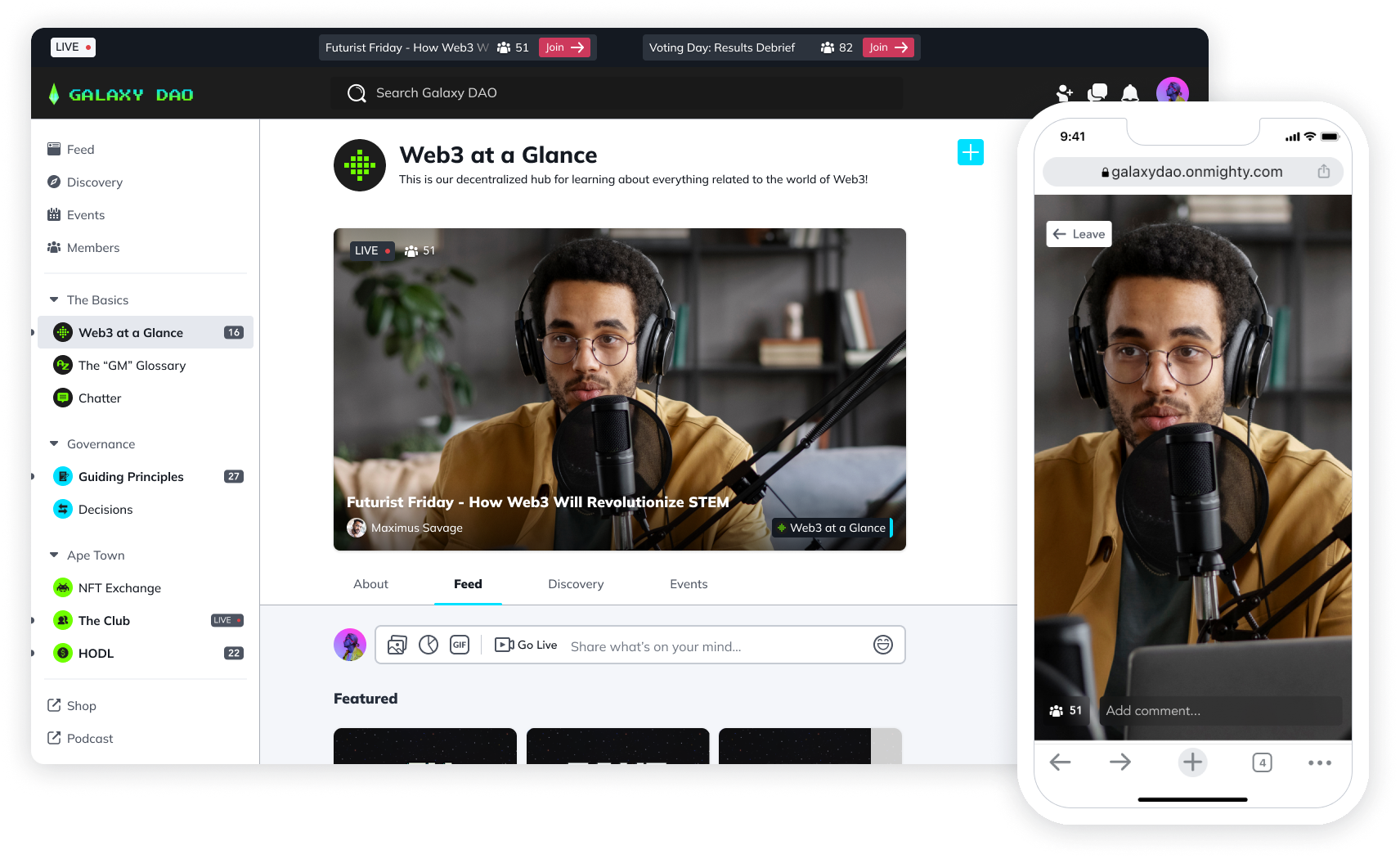
Spaces, not servers
Unlike Mastodon, where users live on servers but can reach across the platform, a Mighty Network is an enclosed community. Instead of having to join different servers, discussions and activities can be organized by Spaces instead. Each Space gives you the option to sell access, host events, add content, all-member chat, or even try live streaming and courses.
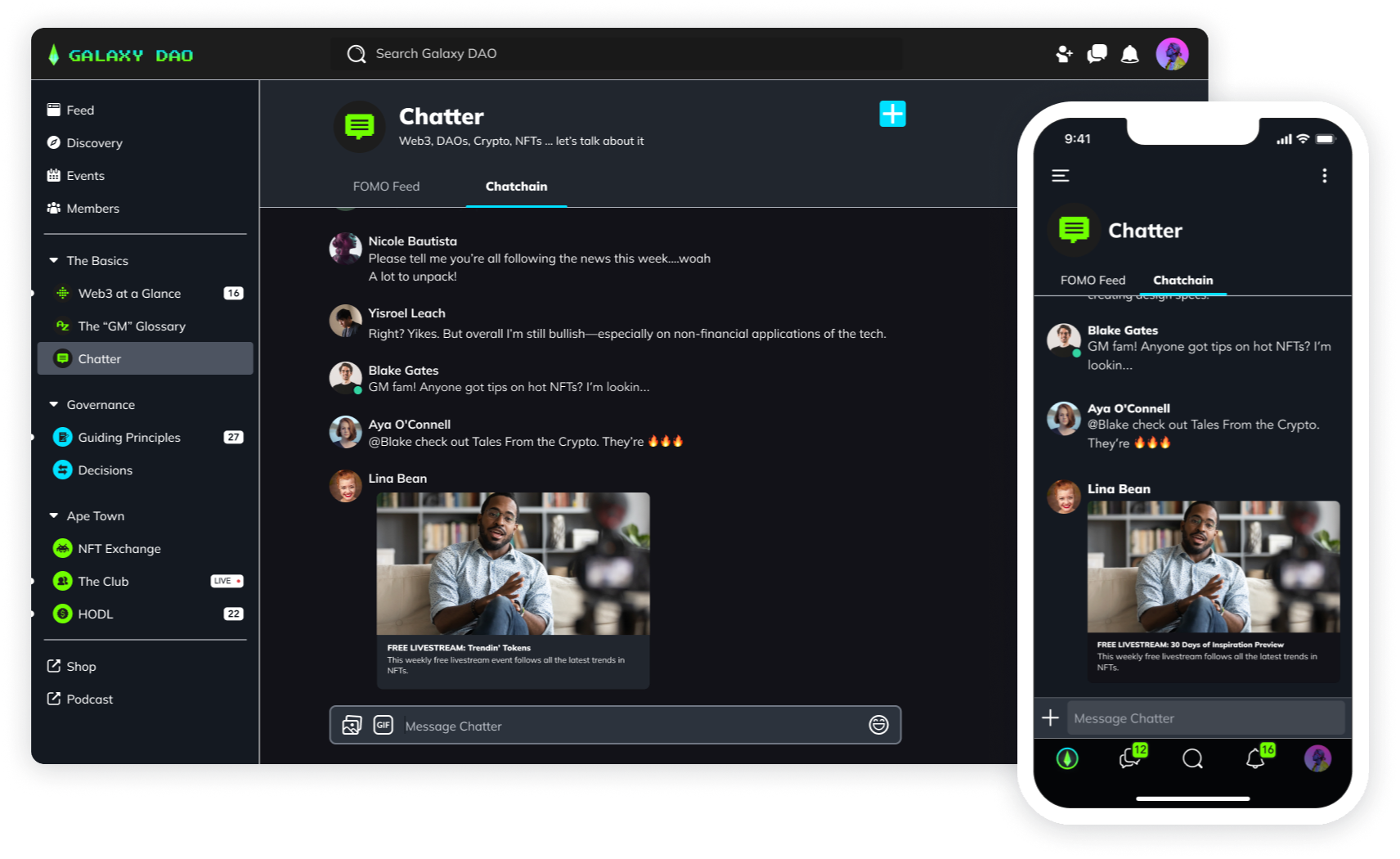
Actual ownership = monetization
If you’ve gone to the work of building a community and you want to monetize it, there’s nothing wrong with that. So instead of worrying about whether your platform has ads or not - like Mastodon does – why not just build on a platform that lets you turn community into a thriving business?
Mighty has payments built-in, making it easy to charge members either a one-time or monthly fee for access (or keep it free if you prefer). Or, some Hosts monetize free communities with paid live events, charging for access to premium Spaces, or selling a course. The sky is the limit, and you can’t do any of this on either Twitter or Mastodon.
Safer
A Mighty Network gives you way more options for safety and moderation. It has the same possibilities as Mastodon for getting users to request access or apply to join. You can moderate content and enlist other hosts as moderators. And since users belong to a community instead of the whole platform, you can be comfortable in the privacy of your own Network.
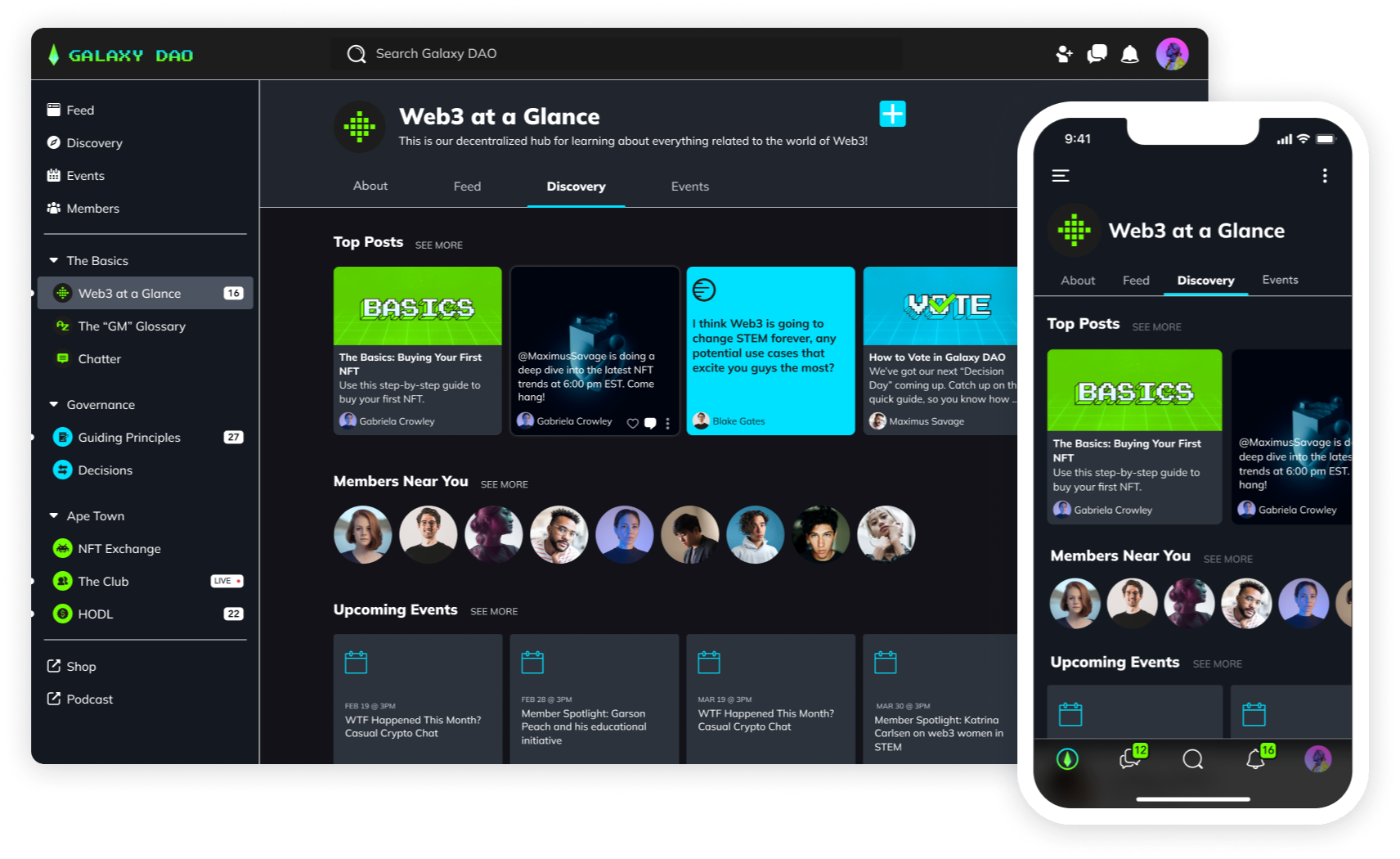
Apps and access
Mighty Networks comes with a great app for all devices. But with Mighty Pro, you can also get a custom-built, branded app that gives you a Mighty Network completely under your own brand. We do the building and offer ongoing support. Schedule a call with us to learn more.
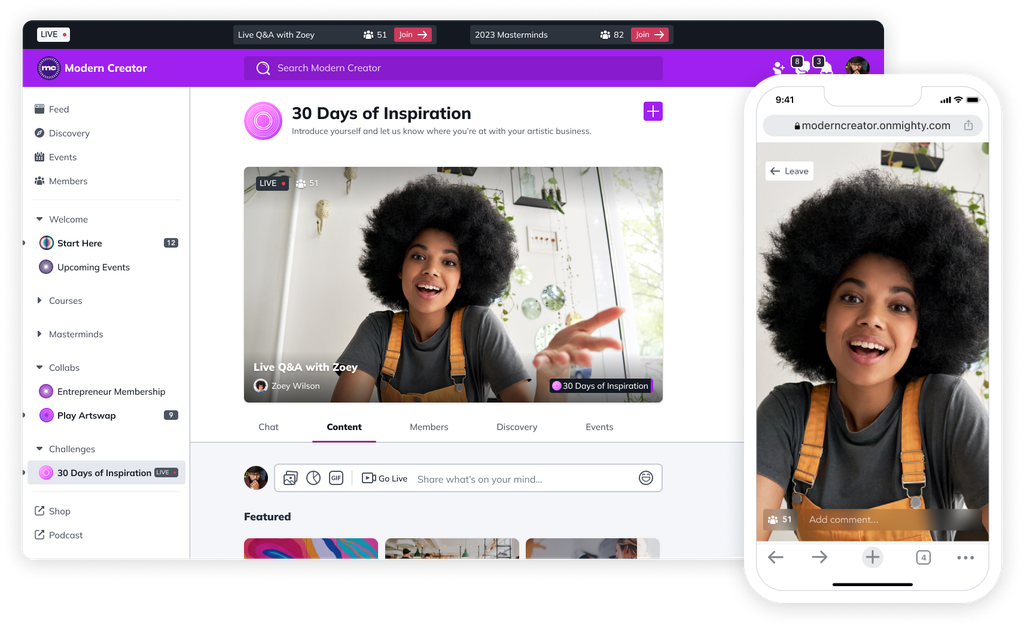
Ready to start?
If you’re looking for a better alternative to both Twitter and Mastodon, the software review site G2 ranks Mighty Networks as the #1 community platform. With Mighty, you get a powerful community engine to bring people together for great conversations. But add in the features like events, courses, and monetization, and you’ve got the tools to build your own powerful social network.
Why not give it a try? It’s free for 14 days, and we won’t ask for your credit card. You could have your own social network up and running in the next 20 minutes, no coding required.
Ready to start building your community?
Ready to start building your community?
Start a free 14-day trial to explore Mighty—no credit card required.
More like this
Join Mighty Community
Learn the principles of Community Design™ (and see them in action) alongside thousands of creators and entrepreneurs. It's free to join!

Online Courses
Creating a Course
Teaching a Course
Course Platforms
Selling a Course
Communities & Memberships
Community Platforms
Managing a Community
Building a Community
Growing a Community
Monetizing a Community
Creators & Entrepreneurs
Monetization
Content Creation
Starting a Business
Website Builders
Creating & Managing a Website
Events
Event Platforms
Hosting & Marketing Events
Branded Apps
Creating a Mobile App
Coaching Apps
Community Apps
Coaching
Mastermind Groups
Starting a Coaching Business
Coaching Platforms
Filter by Category
Online Courses
Communities & Memberships
Creators & Entrepreneurs
Events
Branded Apps
Coaching
Start your free trial
14 Days. No Credit Card Required.

















